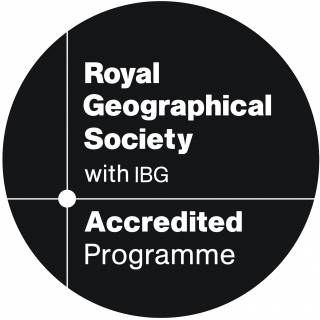New for 2022/2023, the Urban Spatial Science MSc programme explores the theoretical, social and scientific foundations of the modern built environment through a geo-spatial, data-oriented lens.
The new Urban Spatial Science MSc replaces the previous CASA MSc programmes, Smart Cities and Urban Analytics and Spatial Data Science and Visualisation.
CASA Urban Futures Master's Scholarships
Applications are open for the CASA Urban Futures Master's Scholarships worth £10,000 each to students starting this course in September 2024. The funding can be used towards tuition and/or living costs, and is available for students studying either full-time, part-time (over two years) or flexibly (over five years).
Find out more about the scholarship and apply here.
The Urban Spatial Science MSc programme equips students with a multi-disciplinary and critical perspective on approaches to understanding, monitoring and improving global urban resilience and sustainability through the use of data. Taught content explores the theoretical, social and scientific foundations of the modern built environment through a geo-spatial, data-oriented lens.
We also cultivate a practical appreciation of the technical and methodological ‘state-of-the-art’ associated with urban analytics and data-driven decision making, including: mathematical, statistical and simulation modelling, computer programming, spatial analysis and visualisation. Importantly, these practical skills are underpinned by broad theoretical perspectives on demographics, economics, form and function, network interactions and complexity, governance and policy, planning and, crucially, urban science.
The programme is composed of three pathway* options: (1) Smart Cities and Urban Policy, (2) Modelling and Simulation, and (3) Data Visualisation. Core concepts applicable to all programme pathways provide a foundation in urban spatial science, with pathways supporting optional thematic specialisation.
The programme is deliberately cross-disciplinary, drawing on staff with backgrounds in geography, planning, computer science, physics, as well as the arts and humanities.
We do not require a specific undergraduate degree, only a 2:2 classification or equivalent according to the classifications in your country of study (including equivalent professional experience), and seek to encourage creative engagement with the ideas of urban spatial science while recognising the wide range of degrees and prior employment that could be developed with an Urban Spatial Science MSc**. Core modules do not presume prior knowledge and the practical application of taught materials informs the programme aims and learning outcomes.
Through learning what is possible with code, about the benefits of data-informed urban analytics, and (as importantly) about the limitations technology-led solutionism, our graduates are distinguished as being simultaneously technically-capable and critically reflective, able to look past the hype that accompanies the buzz around smart cities, urban data science, and urban science.
Key information
Structure
Students undertake modules to the value of 180 credits. The programme consists of three compulsory 15 credit modules (45 credits), with 45 credits of pathway specific modules alongside, one 15 credit optional module (within CASA), one 15 credit elective module (within CASA or any other UCL department) or a 30-credit optional module (within CASA) and a 60-credit compulsory dissertation module.
The modules on the programme are delivered through a combination of diverse teaching and learning activities in traditional and ‘flipped’ formats. Lectures feature widely, as do computer-based practical classes, tutorials alongside both student and teacher led discussion groups. Self-study is expected throughout the programme.
In addition to formal teaching, students can learn directly from experts in the built environment and spatial analysis through the weekly term time CASA seminar series.
Mode of Study
Full-time: 1 calendar year
Part-time: 2 calendar years
Modular flexible: 5 calendar years
Location
This course is based at Bloomsbury campus.
Academic Partnerships
As part of the dissertation module students may have opportunities to collaboratively work with external organisations on dissertation projects. This usually involves meeting in the partner’s office (the academic supervisor is typically present as well), but on occasion students may be allocated a workspace. However, this is not a requirement of any dissertation project or the module and is on a case-by-case basis.
Assessment
Assessment is undertaken via a variety of means, including practical projects, group presentations, written technical coursework reports, essays, workbooks, and a final research dissertation.
Careers & Alumni
This programme provides students with the skills and knowledge base to embark on a professional or academic path through the highly interdisciplinary field of urban spatial science and the wider urban planning and policy fields (see the summary programme description and learning outcomes for specific skills).
Since its original inception in 2013, graduates have gone on to pursue a wide variety of careers in local government, urban planning, software development and academic research. This is indicative of the breadth of knowledge and opportunities afforded by our programme.
Students have access to termly University and departmental career events, that latter of which involve our active alumni network.
*As defined in the UCL Academic Manual:
Pathway: A Pathway is an informal specialism within a Programme or Route which guides students towards a particular area but which does not lead to a discrete Field of Study. A Pathway is typically defined by the different Option and Elective Modules available within the Programme but this Pathway is not recorded separately in the Student Record System and does not appear on the student’s degree certificate or transcript.
** Applicants with a 3rd class degree (or equivalent) will be automatically rejected unless they have relevant experience (e.g. internships or employment) or extenuating circumstances. Please contact casa-teaching@ucl.ac.uk for any queries on entry requirements.
spatial analysis geography visualisation cities smart cities geographic information systems Close
Close


